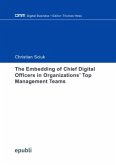Technological advancements and the transforming needs of a young generation of employees challenge how organizations enact leadership. In times of decentralized work environments, employee empowerment, and novel digital solutions for employee collaboration, traditional leadership conceptsare no longer applicable. Moreover, digital leadership is a key requirement for successfully managing digital transformation and a key competitive advantage in a contested labour market. However, companies are exposed to tensions when using novel technologies for leadership: The increasing collection of employee data facilitates novel types of collaboration and empowerment, but it also poses the risk of surveillance and tracking. These tensions and solutions on how to manage them have not yet received sufficient attention in academia.This dissertation, therefore, investigates the phenomenon of leadership in digital transformation. More specifically, it explores the concept, design, anddevelopmentof digital leadership innovation that facilitate empowerment. The dissertation comprises four papers, each of which sheds light on different aspects of the phenomenon. It thereby contributes to the literature on digital innovation for leadership and bridges the fields of information systems and the human resource. Besides these theoretical implications, the study also provides practical implications for the developers of digital leadership solutions and for managers who apply these tools.
Bitte wählen Sie Ihr Anliegen aus.
Rechnungen
Retourenschein anfordern
Bestellstatus
Storno








